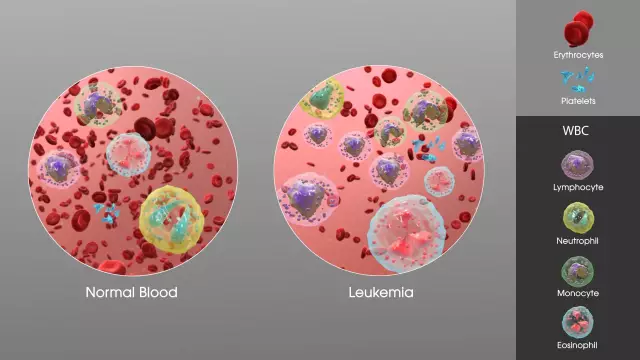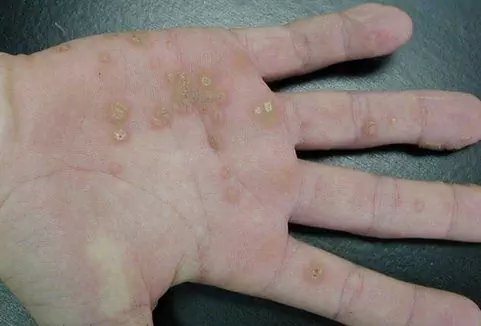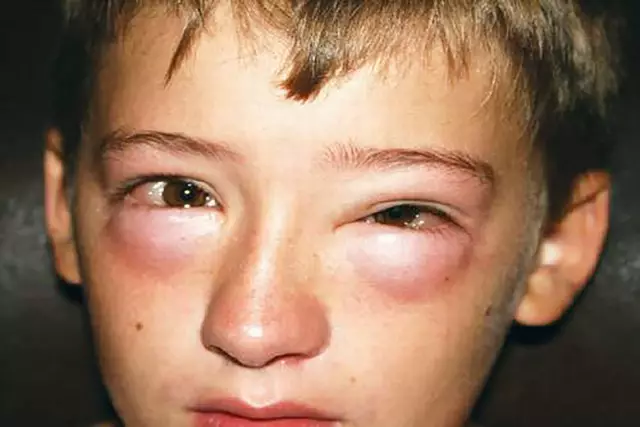- Author Rachel Wainwright wainwright@abchealthonline.com.
- Public 2023-12-15 07:39.
- Last modified 2025-11-02 20:14.
Azotemia

The increased content of nitrogenous metabolic products in human blood, mainly of protein origin, which leads to a violation of the renal excretory function, is called azotemia.
There are three types of azotemia - prerenal, renal and postrenal, differing in origin, but with similar characteristics, namely:
- Increased blood urea nitrogen;
- Decreased renal glomerular filtration rate;
- Increased serum creatinine concentration.
To determine the type of azotemia in laboratory conditions, an index of the ratio of urea nitrogen to creatinine is determined on the basis of a blood test. So, if the indicator is less than 15 - the patient has a renal type of disease, more than 15 - prerenal, significantly more than 15 - postrenal.
Causes of azotemia
As mentioned above, in medicine, there are three types of diseases that differ from each other in the cause of their occurrence. So prerenal azotemia is a consequence of impaired blood supply to the kidneys due to:
- Development of heart failure;
- Hemorrhage;
- Shock;
- Decrease in circulating blood volume.
The main causes of renal azotemia are:
- Acute renal failure;
- Renal parenchyma (glomerulonephritis);
- Acute tubular necrosis.
The consequence of this type of disease is uremia.
The main causes of postrenal azotemia are any mechanical obstacles to the outflow of urine - stones in the ureter, tumors of the bladder or prostate, compression of the ureter by an enlarged uterus (during pregnancy).
Symptoms of azotemia
The patient's condition with azotemia worsens as other symptoms of the underlying disease develop, as well as an increase in the amount of nitrogenous metabolic products in the blood. The main symptoms of azotemia are:
- Oliguria (a sharp decrease in urine output);
- Anuria (cessation of urine flow);
- Dry mouth;
- Bleeding tendency;
- Constant thirst;
- Puffiness (anasarca is not excluded);
- Fluctuations in blood pressure;
- Uremia;
- Tachycardia.
The disease also causes a number of symptoms from various body systems, namely:
- Nausea, acidic ammoniacal odor from the mouth, vomiting, profuse diarrhea, dyspepsia and anemia (digestive system);
- Twitching of the muscles of the arms and legs, tremors, a change of acute excitement by oppression and vice versa, drowsiness, general depression and impaired breathing (nervous system);
- Itching and dryness of the skin, which cause the patient discomfort and anguish, up to scratching and tearing of some areas of the skin during sleep (skin).
Also, among the symptoms of azotemia, apathy, lethargy and severe weakness of the patient are distinguished.
Diagnosis of the disease
For the correct diagnosis and subsequent treatment, the patient should seek advice from a nephrologist or urologist. Doctors will give a referral for a general analysis of blood and urine, and also determine the index of the ratio of the amount of urea nitrogen to creatinine, which will allow you to find out what type of azotemia the patient is sick with.
Treatment of azotemia

With a timely diagnosis and adequate treatment for azotemia, the likelihood of complete recovery is maximum. In cases where a patient seeks medical help with a significant delay, it is much more difficult to achieve complete recovery, even with intensive treatment and correction, the threat of chronic renal failure is high.
Treatment for azotemia usually includes:
- Symptomatic therapy;
- Hemodialysis;
- Elimination of the cause of the occurrence;
- The use of drugs, the action of which is aimed at normalizing blood pressure and improving the functioning of the cardiovascular system.
Prevention of the disease
So, azotemia occurs due to impaired renal function, which leads to the accumulation of nitrogenous metabolic products in the blood. There are three types of disease, each of which has characteristics similar to the other two types, but differs in the causes of occurrence.
For the prevention of the disease, it is recommended to avoid hypothermia and timely treat diseases of the kidneys and urinary system. Self-diagnosis and treatment of azotemia can lead to chronic renal failure, so when the first symptoms appear, you should seek the help of a specialist.
The information is generalized and provided for informational purposes only. At the first sign of illness, see your doctor. Self-medication is hazardous to health!






